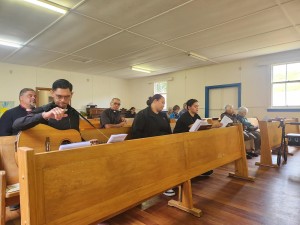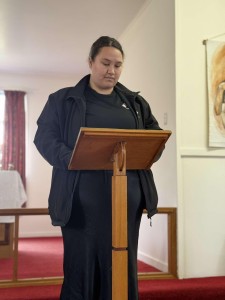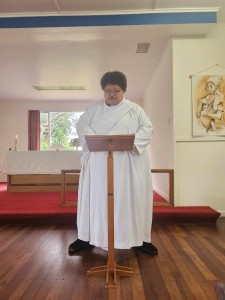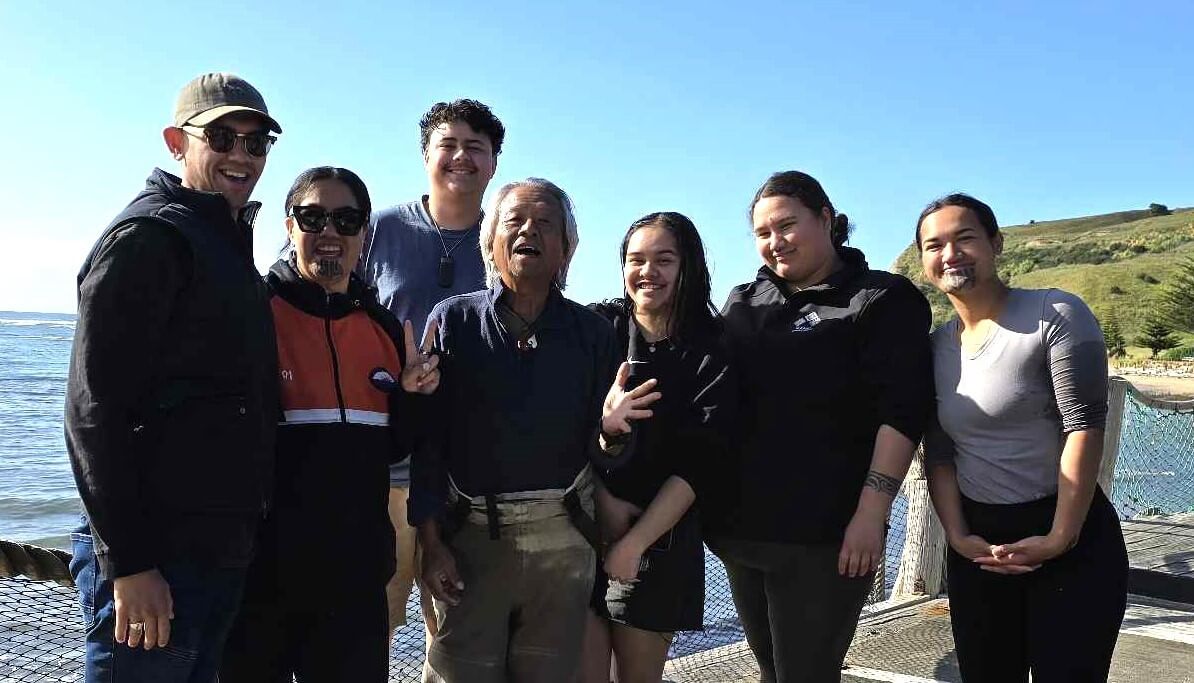From November 22–24, a vibrant group of young leaders gathered in Tūranga-nui-a-Kiwa for the Kāhui Rangatahi Leaders Wānanga. Over the weekend, participants engaged in workshops and discussions around key kaupapa, including Hui Topu 2025, leadership development, and Ngā Hui Māori 2025.

Workshops on waiata, whakapono, and karakia were facilitated by the young leaders, fostering collaboration and shared learning. A highlight of the wānanga was an interactive presentation on leadership pathways by Venerable Ruihana Paenga, offering thought-provoking insights for the future.

Haley Ruru, one of the youth organisers and leaders
The wānanga concluded with the group leading a Eucharist service at Nikora Tapu, Wainui. Karera Wallace and Haley Ruru took charge, with Rev. Ruawhaitiri Ngatai-Mahue leading himene and Rev. Haumoana Kopua-Irwin delivering a compelling kauhau on the parable of the mustard seed.
Looking ahead, Kāhui Rangatahi is planning other leaders’ wānanga in early 2025, continuing to empower and equip rangatahi to lead with faith and vision.

Rev. Haumoana at the pulpit
Rev. Haumoana Kopua-Irwin’s Kauhau:
The Holy Gospel according to Mark, chapter 4, beginning at verse 26
Praise and Glory to God
He also said, “The kingdom of God is as if someone would scatter seed on the ground and would sleep and rise night and day, and the seed would sprout and grow, he does not know how. The earth produces of itself first the stalk, then the head, then the full grain in the head. But when the grain is ripe, at once he goes in with his sickle because the harvest has come.”
He also said, “With what can we compare the kingdom of God, or what parable will we use for it? It is like a mustard seed, which, when sown upon the ground, is the smallest of all the seeds on earth, yet when it is sown it grows up and becomes the greatest of all shrubs and puts forth large branches, so that the birds of the air can make nests in its shade.”
With many such parables he spoke the word to them as they were able to hear it; he did not speak to them except in parables, but he explained everything in private to his disciples.
This is the Gospel of Christ
Praise to Christ the Word.
No reira kia manakohia nga kupu o toku mangai me nga whakaaro o toku ngakau ki tou aroaro e Ihowa, e toku Kamaka, e toku Kaihoko. Amine.
Kia ora ra e hika ma, it’s been a rather busy week has it not!
When we look back on recent events, we can literally see Scripture in motion. When injustice becomes so overwhelming and pervasive, so much so that people cannot help but be emboldened to manifest change. When we think about the Treaty, and when we really look at it, what we see is the sowing of seeds between two cultures, and from which a harvest has sprung forth, and we are that harvest e te whanau, and what a mighty harvest we are.
Today, we bear in mind that it is Aotearoa Sunday, where the church has designated time for us to give thanks for all the marvellous works of Te Pihopatanga o Aotearoa, and as we reflect on our reading, we are provided with a very rich tapestry of assurance and growth, and a reminder that great change often starts as small as the smallest seed. This scripture resonates so strongly with the Hikoi mō te Tiriti, which was lead in no small by rangatahi, our young people, as it speaks to the hope that they have in the hearts with the weight of responsibilities they hold as the leaders of tomorrow. It is as Sir Apirana Ngata said all those years ago:
E tipu e rea mo ngā rā o tō ao
Ko tō ringa ki ngā rākau ā te Pakeha Hei ara mō tō tinana
Ko tō ngākau ki ngā tāonga a ō tīpuna Māori
Hei tikitiki mō tō māhuna
Ko tō wairua ki tō Atua, Nānā nei ngā mea katoa
Grow up and thrive for the days destined to you.
Your hands to the tools of the Pakeha to provide physical sustenance,
Your heart to the treasures of your Māori ancestors as a diadem for your brow,
Your soul to your God, to whom all things belong.
You know, as Coasties, many of us come from a farming background.
Some more that others, I for one barely know the difference between a rake and a broom, but my mother used to scarify paddocks with her uncle up by East Cape Lighthouse. My father use to grow huge vegetable gardens with his whanau in Mangatu.
Therefore, even with my meniscal gardening abilities, it’s pretty hard to imagine a farmer finding much success in just scattering seeds willy nilly, and yet they not only grow, but flourish. Through grace, this tiny mustard seed grows a shrub so vast that it can provide shelter and sustain life.
A great deal of the time transformation is born humbly and without much initial gratitude, even when the results seem distant or uncertain, and yet by the grace of God great things come through.
The seeds of justice, equity, and the recognition of mana motuhake were sown in days of old by our tipuna. They suffered the indignations, they made the sacrifices and gave their whole selves to the kaupapa, and there, in Wellington, the fruits of their labours were harvested.
The Hikoi may seem like just another step in a long journey, and it is human nature to be pessimistic at times, but to see our people mobilised, galvanised and dedicated as never before, I must say that my heart was filled that day, for it represented a deep-rooted hope that peace and prosperity will always prevail over ignorance and vanity.
The scattering of seeds in this parable mirrors the scattering of voices at the Hikoi. Each voice carried that same seed of hope— hope for acknowledgment, for reconciliation, for a shared future.
Like the farmer in our parable, many of our tipuna did not get to see the fruits of their labour, but they trusted in God’s timing, as we should do with all things.
The Hikoi calls us to protect the covenant that is Te Tiriti, and our responsibilities to the promises made nearly 185 years ago.
It highlighted the struggle for true partnership between tangata whenua and tangata Tiriti. As Mihinare, our whakapono and our whakapapa compels us to be active participants in this covenant. We know that Christ’s mission was one of restoration and liberation, and so we must also stand with those who cry out for justice, here and abroad, for that is how we truly honour the spirit of the Treaty of Waitangi.
We grow and we thrive because of one another, by supporting, encouraging and uplifting one another. We can no longer afford, as a nation, to keep each other at bay, to maintain a civil form of détente,
but rather we must reconcile ourselves to our past so that we may move boldly in to the future We are a single nation, yes, we share in the building of this society, but of course, but we have always been separate cultures, and that is not something to be apprehensive of, but we should rejoice at the prospect, appreciate it, nurture it and pass it along.
Because at the heart of this kaupapa are our rangatahi, our young people. There’s an old saying “Ka pu te ruha, ka hao te rangatahi” “When the old net is cast aside, the new net goes fishing”
What that really speaks to e te whanau is that the measure of every passing generation is determined by how successfully they have prepared future generations, but these young leaders, they aren’t waiting to inherit the fruit, they aren’t waiting for the old net to be cast aside, no they’re in the water alongside them, as they should be!
They’re harvesting with such tenacity that you cannot help but rejoice at the sight of it. To have seen Hana-Rawhiti tearing that bill strengthened the resolve of every righteous heart. For every decent Christian acknowledges that Christ calls us to respond to the inequities of society.
Our faith is reflected in how we nurture our potential, blending the best of both worlds, and trusting in the Creator who brings all things to their greatest purpose.
Many of our rangatahi embrace education, technology, relationships and a plethora of skills so much so that they can lead effectively and purposefully, using their talents and knowledge to plant seeds of innovation and progress. At the Hikoi mō te Tiriti, we saw rangatahi taking up the tools of advocacy, media, and co-ordination to amplify their voices. Their engagement is a testament to their readiness to step into leadership roles, bringing fresh perspectives and innovative approaches to the challenges we face as a nation.
For so long we have been called upon to uphold our tikanga, our reo, and our whakapapa—to honor the rich heritage that shapes our identity. And in-spite of the heartache that has been borne in that journey, our people stand firm, we are as resilient as that mighty tree Jesus speaks of.
We are called to always place our trust in God, the ultimate source of growth and transformation. For it is God who brings forth the harvest. We are merely planters and caretakers, participating in God’s work, and the reward is greater than anything we could measure.
As Christians, we recognise the importance of grounding our activism, leadership, and cultural identity in faith. This Hikoi was not just a political event; it was a spiritual journey, calling us to live out the gospel in a very tangible way. As for our youth, this is a reminder to seek God’s guidance and strength as we step into our roles as leaders, ensuring that we are always aligned with God’s purpose.
E te whanau, we must encourage one another to continue to faithfully plant the seeds, trusting that God will bring the harvest in due time.
May those seeds be planted with hope for justice, partnership, and reconciliation. May it become so strong, tall and mighty that future generations, like the birds of the air, may rest peacefully therein.
